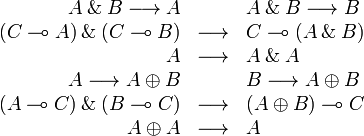Semantics
From LLWiki
(Difference between revisions)
(use of latex arrays for improving the presentation) |
(→Additive structure: diagonal) |
||
| Line 75: | Line 75: | ||
A\with B \longrightarrow A &\quad& A\with B \longrightarrow B\\ |
A\with B \longrightarrow A &\quad& A\with B \longrightarrow B\\ |
||
(C\limp A)\with(C\limp B) &\longrightarrow& C\limp(A\with B)\\ |
(C\limp A)\with(C\limp B) &\longrightarrow& C\limp(A\with B)\\ |
||
| + | A &\longrightarrow& A\with A\\ |
||
A \longrightarrow A\plus B &\quad& B \longrightarrow A\plus B\\ |
A \longrightarrow A\plus B &\quad& B \longrightarrow A\plus B\\ |
||
(A\limp C)\with(B\limp C) &\longrightarrow& (A\plus B)\limp C\\ |
(A\limp C)\with(B\limp C) &\longrightarrow& (A\plus B)\limp C\\ |
||
| + | A\plus A &\longrightarrow& A\\ |
||
\end{array} |
\end{array} |
||
</math> |
</math> |
||
Revision as of 11:51, 15 March 2009
Linear Logic has numerous semantics some of which are described in details in the next sections. We give here an overview of the common properties that one may find in most of these models. We will denote by  the fact that there is a canonical morphism from A to B and by A˜B the fact that there is a canonical isomorphism between A and B. By "canonical" we mean that these (iso)morphisms are natural transformations.
the fact that there is a canonical morphism from A to B and by A˜B the fact that there is a canonical isomorphism between A and B. By "canonical" we mean that these (iso)morphisms are natural transformations.
Contents |
Linear negation
![\begin{array}{rclcrcl}
A\biorth &=& A\\
(A\tens B)\orth &\sim& A\orth\parr B\orth &\quad& \one\orth &\sim& \bot\\
(A\parr B)\orth &\sim& A\orth\tens B\orth &\quad& \bot\orth &\sim& \one\\
(A\with B)\orth &\sim& A\orth\plus B\orth &\quad& \top\orth &\sim& \zero\\
(A\plus B)\orth &\sim& A\orth\with B\orth &\quad& \zero\orth &\sim& \top\\
(\oc A)\orth &\sim& \wn A\orth\\
(\wn A)\orth &\sim& \oc A\orth\\[1ex]
A\limp B &\sim& A\orth\parr B\\
A\limp B &\sim& B\orth\limp A\orth\\
\end{array}](/mediawiki/images/math/8/a/1/8a148ead9820f4edb3b751bcf1008abf.png)
Neutrals

Commutativity

Associativity

Multiplicative semi-distributivity

Multiplicative-additive distributivity

Additive structure

Exponential structure

Monoidality of exponential

The exponential isomorphism
